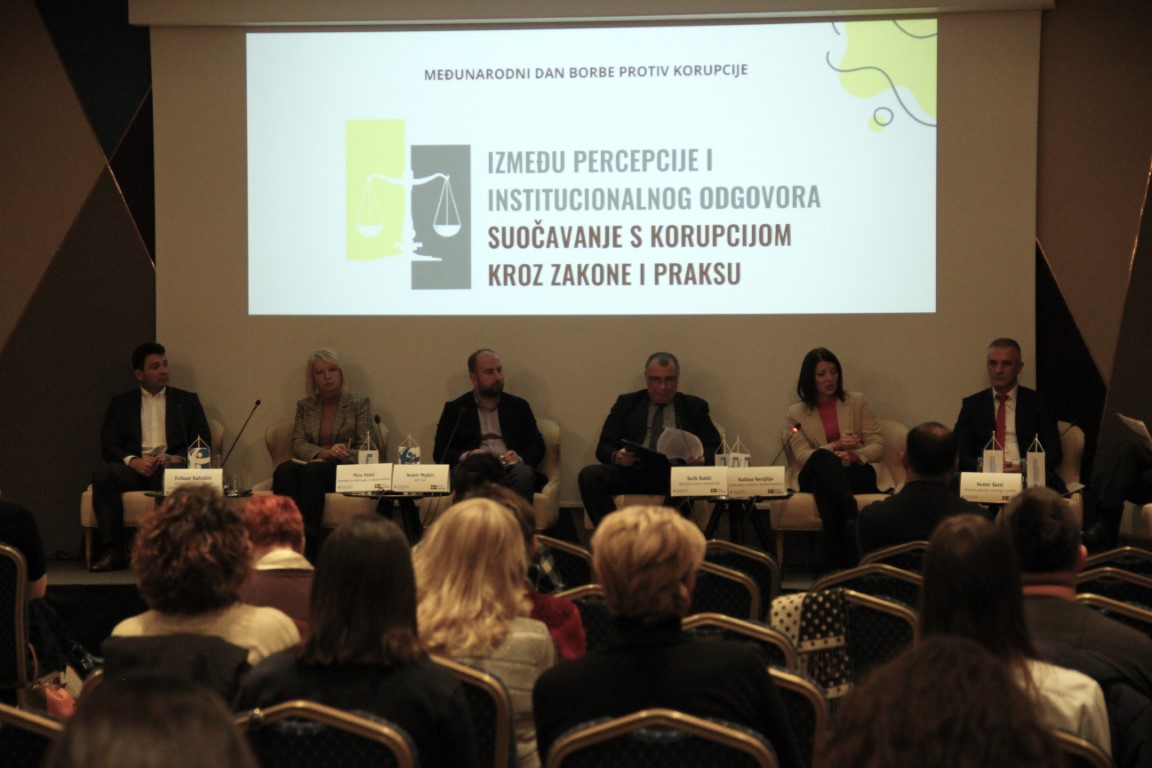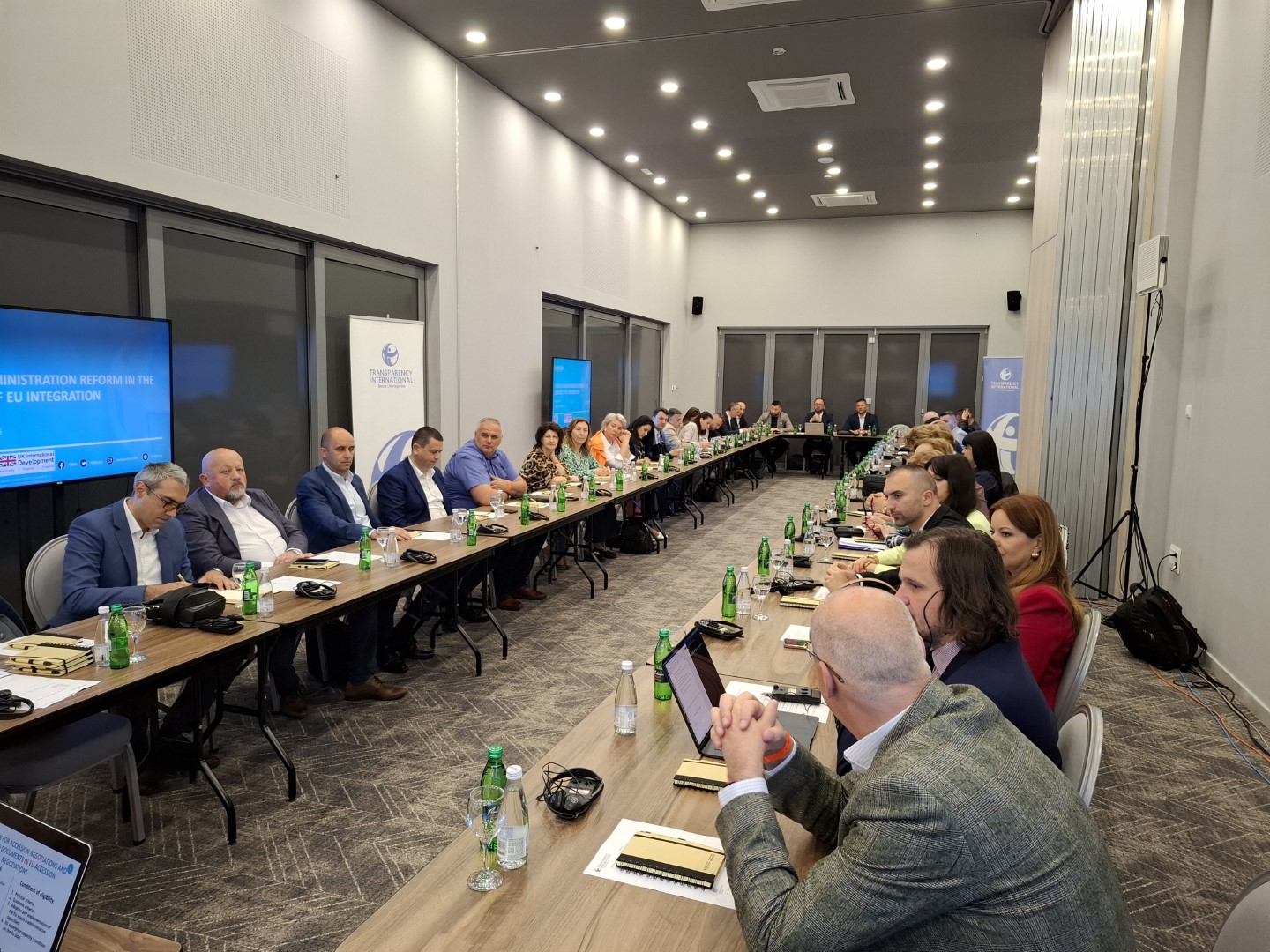Corruption among the most important problems of BH citizens, national issues almost insignificant
Sarajevo, December 11, 2023 – Corruption represents one of the three most important problems for a third of the citizens of BiH, while national issues are among the least...

Sarajevo, December 11, 2023 – Corruption represents one of the three most important problems for a third of the citizens of BiH, while national issues are among the least important topics, prioritized by only about 5% of the BiH citizens, according to public opinion surveys on the perception of corruption that was presented by Transparency International in BiH (TI BH) at the conference marking the International Anti-Corruption Day, held today in Sarajevo.
The findings of the latest public opinion survey on corruption in Bosnia and Herzegovina [1] showed that 37.2% of citizens see low wages as a problem, while among the three most important issues that citizens of Bosnia and Herzegovina face on a daily basis are emigration (34.6%) and corruption (34.2%). On the other hand, national issues represent one of the least important topics to which only 5.2% of respondents attach importance, and together with public administration (2.0%) and other issues (4%), these problems are less important for BiH citizens.
“Corruption is one of the biggest obstacles to the development of this country, it reduces trust in institutions, lowers the quality of public services and deters foreign investments,” said Sara Lindegren, the deputy ambassador of Sweden at the opening of the conference.
The research results presented at the conference “Between Perception and Institutional Response: Facing Corruption Through Laws and Practice” supported by Sweden show that almost 10% of citizens support corruption in some form and citizens notice the most corruption in healthcare (53.9%) , police (43.1%) and judiciary (40.7%), while almost a third, i.e. 30.7% of the citizens of BiH believe that corruption is most prevalent in political parties, and 80 percent of those surveyed believe that the institutions that should fight against corruption are ineffective, which is also reflected in their willingness to report the corruption.
“The data clearly show that citizens believe the authorities and institutions have not done anything to improve the situation when it comes to corruption, which is also visible from the data on the level of efficiency and trust in institutions,” said Ivana Korajlić, director of Transparency International in BiH, commenting the results of the research, adding that “citizens believe that it is not worth getting involved in the fight and reporting corruption because nothing will happen based on their reports – citizens have simply come to terms with the fact that decisions are made in a way that is in the interest of individuals or groups close to the government” concluded Korajlić.
The research shows that the perception of corruption in the eyes of citizens is on the rise, so 63% of respondents stated that the level of corruption in BiH is very high, which is an increase compared to 2019, when 61% of respondents had this opinion, which confirmed the findings of many studies that follow the level of corruption in Bosnia and Herzegovina, such as the TI Index of Corruption Perception – CPI, according to which it is at a record level in Bosnia and Herzegovina and is constantly growing.
Halil Lagumdžija, president of the High Judicial and Prosecutorial Council of Bosnia and Herzegovina, assessed that “corruption is a scourge that has become a model of behavior in BiH society”, adding that, as the first member of the HJPC, he believes that the judiciary has not given the right answer in the fight against corruption “Prosecutors point out that a relatively small number of proceedings have been initiated by competent police agencies, it is more based on reports from citizens or press reports,” Lagumdžija concluded.
“The main characteristics of high corruption and organized crime are organization, coordination and efficiency,” said Erduan Kafedžić, head of the Office for Anti-Corruption and Quality Control of the Sarajevo Canton, adding that these qualities are not present in the institutional system that should monitor and fight against it.
The conference also discussed the challenges that accompany the process of improving the fight against corruption in BiH, where the legal framework, i.e. its inadequacy, was identified as the main problem in this area. This primarily refers to changes to the Law on the HJPC, which do not allow full transparency and accountability of institutions and holders of judicial functions, while the application of such a bad law is impossible because the department for checking the property records of judges and prosecutors has not yet been established.
[1] Research conducted on a sample of 1,220 respondents in the entire territory of Bosnia and Herzegovina
Get involved
Stay tuned
Subscribe to our newsletter and receive periodic notifications about our, announcements, calls and activities via email.
Don't miss it
If you want to receive our announcements immediately after the publication, leave your e-mail address in the field below.



